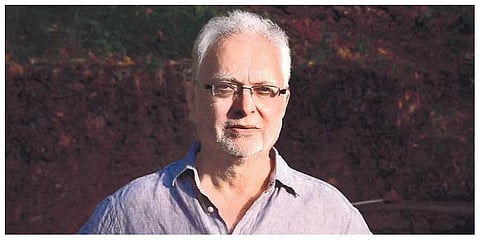

The title of your memoir ––Fragments Against My Ruin––is very interesting. What does it signify?
When my publisher V Karthika suggested I write an autobiography, my first reaction was, “Why? Am I going to die?” And when I finished writing it, I thought of a range of titles from Scribblers Tale to Parsi Custard, but they liked none. We went through some 20-odd titles. Then when I was re-reading, for the 10,000th time, TS Elliot, I came across the line... “These fragments I have shored against my ruin”. Immediately the title struck me. Another option was Elliot’s Deliberate Disguises but it may have implied that everything I am writing is a disguise. So my publisher and I decided on 'Fragments Against My Ruin.'
Very few people know about your earlier journalistic career. Tell us more.
It was long, long back. I have almost forgotten about it. I started by writing for anyone who offered me work. But my criteria were not to write for the Daily Mail or The Daily Telegraph, because to my mind, I believed that they were conservative. But anybody else who paid me money, I would write. So I was an investigative journalist for Economic & Political Weekly (EPW), wrote for publications such as The Spectator, and Debonair too. At that time, when I was writing for EPW, I didn’t think of it as investigative writing, rather it was writings to influence India to be socialist.
How has your early childhood in Pune influenced your writings?
I lived with my maasis (aunts) in Pune. My parents were moving around the country as my father was in the Armed Forces. I realised early on what poverty was because I used to see people die on the streets because of hunger. It affected me a lot. So when EPW gave me the chance to write, I thought it was my time to give back and write about the society.
Do you think you have changed as a writer over the last six decades?
When I was young, I used to get upset when someone edited my writings. But now I have changed. I like being edited and corrected. In my youth, I had the idea that I have to be profound. Today, I want to be as simple as possible. As a young man, I was extremely conceited about my intellect. I thought everyone else was a fool. Only I was right. But the realisation that I could be wrong dawned on me as I grew older.
You were the only reporter in the room when The Beatles met the Maharishi Mahesh Yogi in 1967.
How so?
I was at the right place at the right time. You often attribute your success to luck. Why? I believe talent can be cultivated. As a trained quantum physicist from Cambridge University, I was offered a job with the Atomic Energy department in India when Indira Gandhi was the prime minister. But I declined the offer as my socialist leanings were definitely not aligned with making an atomic bomb. So I became a writer instead. You want people to read you and say that they love your thoughts. I think I was lucky in that way.
Tell us about what you are writing next.
A web-series on Bandit Queen is ready. I have written it from the point of view of inspector Rajendra Chaturvedi who got Phoolan Devi to surrender. It is set to be released soon on an OTT platform.